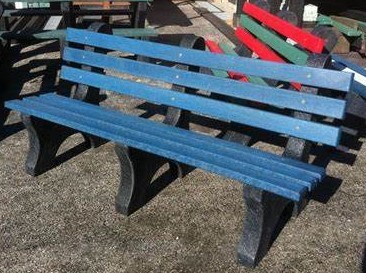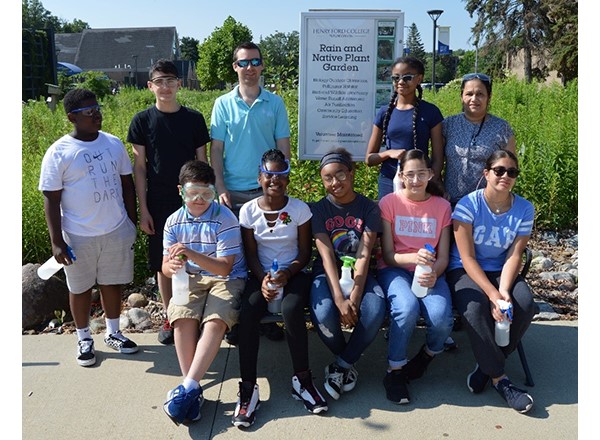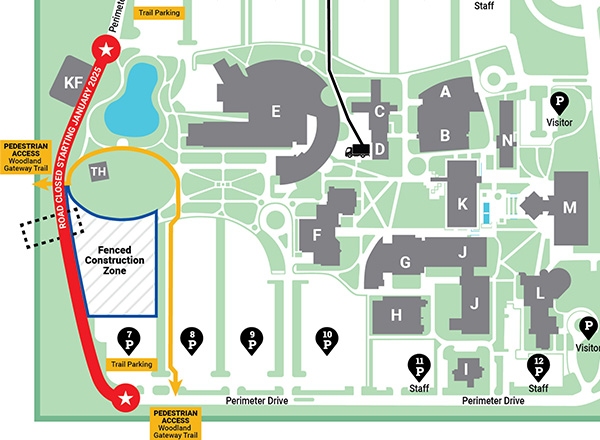Sustainability in Action
HFC has several programs, organizations, and initiatives focused on aspects of sustainability. This website is a central location for those efforts.
What is Sustainability?
By one definition, sustainability means "to create and maintain conditions under which humans and nature can exist in productive harmony and that permit fulfilling social, economic, and other requirements of present and future generations."
- United States Environmental Protection Agency
The HFC community works collaboratively to prepare learners to succeed in a global society and to serve the public good. Both of these claims include sustainability, conservation, recycling and materials management, environmental responsibility, and student education. We advance these goals through many campus-wide groups and individual efforts in our curricula, the Student Environmental Association, HFC Facilities Department, and Sustainable HFC, among others.
Sustainable HFC
Founded in late 2017, Sustainable HFC welcomes HFC employees and students to meet monthly and address sustainability issues and projects. The group's goals are:
- Support a culture of environmental sustainability at HFC through social action, education, and service.
- Recommend and study ideas, policies, and initiatives for College governance.
- Educate the HFC community on sustainability movements and successes through College media resources, presentations, workshops, and partnerships.
- Celebrate and support individual and group efforts across the College.
- Welcome and encourage representation and insight from everyone who cares about sustainability. Learn and grow through different perspectives and experiences.
- Encourage service-learning education opportunities and leadership for students, staff, educators, and our broader community.
For meeting agendas, minutes, and more information please visit Sustainable HFC.
The Environmental Studies program focuses on sustainability
The Environmental Studies (Associate in Science) program emphasizes the interdisciplinary nature of environmental problem-solving at the local, regional, and international levels. Students completing this program may transfer to bachelor's degree programs in at least four broad areas: land resources, nature studies, resource and policy management, and urban science.
How can students get involved?
We encourage students to become involved both formally and informally. Formally, you may join the Student Environmental Association or other student groups that address environmental awareness. Informally, there are many steps you can personally take to advance sustainability, beginning with simple steps to recycle and to use sustainable materials in your daily life.
Student Environmental Association
The Student Environmental Association promotes and provides programs relating to the environment. The club contributes to the understanding and appreciation of natural resources and wildlife and provides a forum to discuss environmental concerns.
The club advisor is Mary Parekunnel, Ph.D.
mparekunnel@hfcc.edu
Faculty, Biology/Environmental Science
313 317 1747
Facilities Management Projects
The Facilities Services Department is focused on sustainability and environmental stewardship. Efforts include material management and recycling, storm water management practices, and more.
Facilities Material Management and Industrial Recycling
Recycling and hazardous materials managed in 2018:
- 6,139 light bulbs recycled.
- 705 pounds of alkaline batteries recycled.
- 1,342 pounds of lead acid batteries recycled.
- 65,540 pounds of scrap metal recycled.
- 690 gallons of used oil recycled.
- 60 gallons of anti-freeze recycled.
- 300 gallons of fuel oil recycled.
- Refrigerant housing items. HVAC students recover refrigerant from non-working items according to EPA guidelines. Properly tagged items are placed in a scrap dumpster for recycling.
- We host Wayne County’s annual Hazardous Household Waste Collection on campus. In 2017, this resulted in 183,567 pounds collected from more than 1,974 people. In 2018, the number was 252,553 lbs with 2,286 vehicles in attendance.
Materials collected included household paints, stains, dyes, floor care items, furniture polish, bathroom cleaners, lawn and garden chemicals, pesticides, fertilizers antifreeze, motor oil, gasoline automotive batteries, dry cell batteries, propane tanks, old computers, printers, scanners, TV's, cell phones, fax machines mercury containing thermometers, thermostats and elemental mercury, fluorescent light bulbs (standard and compact), smoke detectors, fire extinguishers, Pharmaceutical Waste (Non-controlled substances), CRT televisions, and monitors.
Stormwater Management
The college’s storm water management plan ensures that all water that is discharged to the Rouge River from the College’s property is storm water and not sanitary water. The Facilities Services Department manages the College’s MS4 Storm Water Permit. The College employs best practices in housekeeping to ensure all storm water is as clean as possible before it is discharged to the Rouge River.
Some examples of Henry Ford College’s housekeeping practices include:
- Parking Lot and Street Sweeping - Conducted monthly from March to October and additionally as needed.
- Monthly Routine Good Housekeeping Inspections conducted by one of the three certified storm water operators on campus.
- Bi-yearly Comprehensive Good Housekeeping Inspections conducted by one of three certified storm water operators on campus.
- Main Campus and East Campus Detention Ponds are chemically treated by a certified chemical applicator to treat invasive plant species.
- The Vortex filtering system in parking lot #7 filters out and holds unwanted sediment from the parking lots and is cleaned as necessary.
- Catch Basins are inspected during monthly inspections and are cleaned out as needed.
- Annually host a Rouge Rescue event on campus with Friends of the Rouge to remove invasive plant species and trash along the Rouge River behind the main campus.
What is an MS4 Permit?
A Municipal Separate Storm Sewer System (MS4) is a program implemented to reduce the amount of pollutants that enter the surface waters of the state. A system of drainage is considered to be a MS4 as long as it is not connected to a sewer that contains both stormwater and sanitary lines (combined sewers), or a sewage treatment plant.
A primary goal of the MS4 program is to reduce and completely eliminate illicit discharges. An illicit discharge is any discharge to a separate stormwater system that is not stormwater or groundwater. Illicit discharges occur when contaminated water is released into storm sewers rather than properly being directed to sanitary sewers. The outcome of illicit connections is polluted lakes, rivers, and streams. Many municipalities enforce the elimination of illicit discharges by prohibiting illicit discharges in their ordinance.
Henry Ford College is a member of the Alliance of Rouge Communities and have collaborated with other communities on our MS4. To review and comment on HFC plan, please visit https://www.allianceofrougecommunities.com/swplanreview.html.
Related stories
We’ll Take the Pond, Hold the Scum (Mirror News archive, 2010)
Integrated Energy Master Plan (IEMP)
The Integrated Energy Master Plan (IEMP) is a 20-year partnership between HFC and Johnson Controls Inc. (JCI) to achieve Global Best Practices in Energy Management and Education.
The IEMP was approved by the HFC Board of Trustees in December 2019. The initiative includes $27 million in upgrades to every area of our campus. The IEMP scope includes upgrades to:
- District Heating System: Upgraded system includes high efficiency boilers and integration of heat recovery from combine heat and power plant.
- HVAC Upgrades: Many improvements to air-handling equipment for better control and air quality.
- Controls: Complete system upgrade to ensure occupant comfort.
- Lighting: Upgraded to LED lighting campus-wide.
- Solar: Generating our own power from the sun.
- Water Conservation: Upgraded water fixtures and toilets.
- Xeriscaping: Zero water landscaping and upkeep.
- Building Envelope: Focused roof upgrades and window replacements.
- Academic Programs: Coordinated approach to integrate performance improvements with academic curriculum.
Xeriscaping
Xeriscaping is the process of landscaping, or gardening that reduces or eliminates the need for irrigation. In Michigan this is done by establishing native landscapes. Native landscaping is becoming an increasingly important part of community planning efforts in order to create landscapes which are resilient and can help support healthy communities and our ecosystems.
HFC is establishing two types of Xeriscaping methods:
- Native Prairies (seed mix): located on the perimeter of campus and on some medians, The native prairies areas are established by broadcasting a native seed mix on a prepared site.
- The sites were prepared in September 2021 and seeded in December 2021
- Establishing native prairies takes time and planning to ensure they grow properly. It takes about three to four years for a native prairie to become fully mature.
- Native Gardens (plugs): planted in 7 locations around campus in high-visibility areas near buildings and circle drives. These areas create native landscapes by using ‘plugs’ (live plants) which typically results in a more ‘formal’ or intentional aesthetic.
- The native gardens were planted in September 2021
- Establishing native gardens takes about 1-2 years, after which irrigation will no longer be required.
How you can help: Be aware of the xeriscaped areas and be patient as the new landscaping takes hold over the coming years and becomes more attractive. Stick to paved walkways and avoid walking through pollinator habitats.
HFC Sustainability Initiatives
Flip Your Lids for Henry Ford Benches Program
The Sustainable HFC committee is participating in “A Bench for Caps” (ABC) recycling program offered by Green Tree Plastics. The company is based in Evansville, Indiana and manufactures plastic products using 100% recycled plastics.
The committee intends to purchase several benches for the HFC campus. For each bench ordered, Green Tree Plastics requires an organization collect 200 lbs. of plastic caps and turn them in to purchase a 6’ bench for a cost of $345, which is less than typical retail prices.
At HFC, the Welcome Center Staff have been collecting caps since January 2023 and currently have enough for two benches intended for the Welcome center. The collecting is ongoing, and the Committee intends to place several more blue and black recycled plastic benches around campus.

A blue bench made out of recycled plastic products
How you can help:
Caps can be placed in any of the cap collection bins in the following locations on campus:
- Health Sciences Building G: G-122, STEM Office.
- Science Building J: south wing hallway.
- Welcome Center Building WC: Public drop off- main desk, Staff drop off- break room.

A recycle bin where lids can be dropped off at
Organizations or individuals interested in sponsoring a bench to cover the cost, please contact Nancy Knick nrknick@hfcc.edu or Sara Gonzalez at sagonzalez@hfcc.edu.
A plaque will be placed on the bench with the sponsor’s name.
Battery Recycling
HFC Facilities offers a number of battery collection bins across campus. When batteries are deposited into the regular trash or landfill, they can leak metals such as cadmium, lead, zinc, manganese, nickel, silver, mercury, and lithium, and acids into the environment. This has negative health impacts for both humans and the environment. Recycled batteries decrease the need to mine metals for batteries, affecting human rights and resource issues. Please use one of HFC’s provided locations, it all adds up: in 2018, HFC diverted 705 pounds of alkaline batteries from landfills.
Current Locations:
- A - LRC 1st floor (Outside A-117)
- B - Library 1st floor (main entrance)
- D - Facilities 1st floor (Outside D-105)
- E - Tech 1st floor (Outside E-113)
- F - Fine Arts 1st floor (Outside F-161)
- G - Health Careers 1st floor (Main Atrium near elevator)
- J - New Science 1st floor (Near elevator/ Stairs)
- K - Liberal Arts (West Entrance)
- L - ASCC 1st (Near Elevator) and 3rd floor (L-332 Pantry)
- M - Student Center 1st floor (Main Vestibule near M-102)
- N - Campus Safety 1st floor (Below Dispatcher window)
Bin full? Battery is too big? Facilities empties battery bins on a schedule with other industrial material pickups. If a bin is overflowing, or if you have batteries too large for the battery bins, please contact facilities at 313-845-6320.
Campus Hydration Stations
HFC has several hydration stations across campus where students and employees can refill their water bottles. This significantly reduces plastic waste. A single hydration station in the J building was used 7014 times in its first 10 months, representing 7014 plastic bottles that were never created.
Learn more about the beginnings of hydration stations at HFC.
Hydration station locations
There are currently 8 hydration stations on the HFC main campus and one on the east campus. We plan to add more stations on main campus and east campus.
A Building (Learning Resources Center): outside A-104 near the restroom
Wall unit with counter sponsored by Phi Theta Kappa and the HFC School of STEME Building (Technology): outside E-175, between vending machines
Stand up unit provided by Total VendingH Building (Athletic Memorial): outside H-105 Woman's Locker Room
Wall unit with counter sponsored by HFC FacilitiesJ Building (New Science): outside J-145 Wall unit with counter sponsored by the HFC Biology Department
K Building (Liberal Arts): outside K-161
Wall unit with counter sponsored by Phi Theta Kappa and the HFC School of STEMM Building (Student Center/Cafeteria): outside M-103 (Radio Station), next to vending machines.
Stand up unit provided by Total VendingM Building (Student Activities): outside M-124/126 restrooms
Wall unit with counter sponsored by HFC FacilitiesEast Campus: outside the SN-104 Great Room
Wall unit with counter sponsored by HFC Facilities
HFC STEM’s Rain and Native Plant Garden

Environmental Science camp middle-schoolers in front of the Rain and Native Plant Garden
The HFC Rain and Native Plant Garden was planted in 2012 during the Science Building renovations. Roughly 1,000 square feet, the garden serves as an outdoor biology classroom, a pollinator/bird/wildlife habitat, a water runoff abatement and air purification system, and a community education and service-learning resource. The garden is on HFC’s main campus between the Science (J) and Athletics (H) buildings. The garden is open to the public during the daytime.
Volunteers maintain the garden, which requires frequent planting of native species and removal of invasive species. The HFC Biology Department and the School of Science, Technology, Engineering, and Mathematics (STEM) are proud to have such a wonderful resource and representation of HFC’s commitment to environmental education, service-learning, and stewardship at their disposal.
The Rain and Native Plant Garden also boasts Monarch and Wildlife Habitat certifications.
Paper and Plastic Recycling Program
As of January 2020, HFC is starting a paper and plastic recycling pilot. This pilot program will ensure long-lasting success by working out any operational kinks before expanding to other areas on both campuses. Success is dependent on every person in the HFC community conscientiously and knowledgeably recycling.
Current Locations:
- The Pavilion in the Student & Culinary Arts Center (Bldg. M)
- The Skylight Café in the Student & Culinary Arts Center (Bldg. M)
How to Responsibly Recycle at HFC (Video)
Main Guidelines:
- Putting non-recyclable materials (even well intentioned) into recycling bins can make an entire bin contents non-recyclable trash.
- All food and liquid must be dumped in landfill bin.
- Only clean paper and plastic materials can be recycled (e.g. no greasy pizza boxes).
- HFC does not yet recycle glass or aluminum so that should go in the landfill bin or be dropped in your at home curbside recycling if possible.
- When in doubt, throw it out (in the landfill bin) rather than contaminate the recycling.
Confidential Documents (Employees)
- HFC participates in the Shred-it shredding and recycling program
- Bins are located across campus, in various office spaces, mailrooms, etc.
- HFC saved 21.26 trees from destruction in 2018 (according to Shred-it).
- All confidential or sensitive documents must be placed in Shred-it bins.
For questions and/or more information about Sustainable HFC, contact greenideas@hfcc.edu



